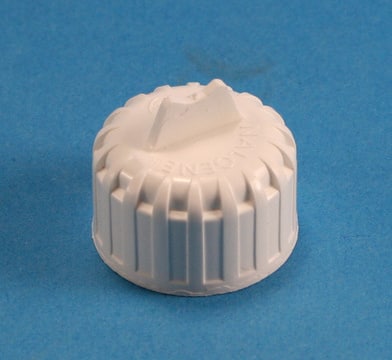T2418
Nalgene® centrifuge tubes, Oak Ridge Style 3114
capacity 50 mL, pack of 2 ea
Synonym(s):
High-Speed Centrifuge Tubes, Nalgene tubes
Sign Into View Organizational & Contract Pricing
All Photos(1)
About This Item
UNSPSC Code:
41121703
eCl@ss:
32119210
NACRES:
NB.11
Recommended Products
material
FEP
Tefzel® closure
round bottom tube
screw top cap
sterility
non-sterile
feature
RCF 50,000 × g with sealing cap assembly
packaging
pack of 2 ea
manufacturer/tradename
Nalgene® 3114-0050
capacity
50 mL
Looking for similar products? Visit Product Comparison Guide
General description
Nalgene® Oak ridge high-speed centrifuge tubes, made with PTFE®fluoropolymer and closure made with Tefzel®, are the perfect solution for conducting high-speed centrifugation of aggressive chemicals. These tubes are suitable for chloroform and phenol extractions.
Application
Nalgene® centrifuge tube, Oak Ridge Style 3114 is suitable for use in tagged protein purification.
Features and Benefits
- Withstands temperatures ranging from -100°C to +150°C (-148°F to +302°F).
- Leakproof closures help to prevent material loss for spins <10,000 × g.
- Handles up to 50,000 x g with Nalgene sealing cap assemblies.
- Proper performance requires filling to at least 100% total capacity.
- Autoclavable and provides biohazard protection when used with supplied Nalgene closure or PTFE FEP.
Other Notes
Proper performance can be achieved by filling to at least 100% of thetotal capacity.
Legal Information
Nalgene is a registered trademark of Thermo Fisher Scientific or its subsidiaries
Teflon is a registered trademark of E. I. du Pont de Nemours and Company
Tefzel is a registered trademark of E. I. du Pont de Nemours and Company
Certificates of Analysis (COA)
Search for Certificates of Analysis (COA) by entering the products Lot/Batch Number. Lot and Batch Numbers can be found on a product’s label following the words ‘Lot’ or ‘Batch’.
Already Own This Product?
Find documentation for the products that you have recently purchased in the Document Library.
Customers Also Viewed
Mark W Soo et al.
Bio-protocol, 11(18), e4168-e4168 (2021-10-26)
In the field of chromatin biology, a major goal of understanding the roles of histone post-translational modifications is to identify the proteins and domains that recognize these modifications. Synthetic histone peptides containing one or more modifications are a key tool
Our team of scientists has experience in all areas of research including Life Science, Material Science, Chemical Synthesis, Chromatography, Analytical and many others.
Contact Technical Service







